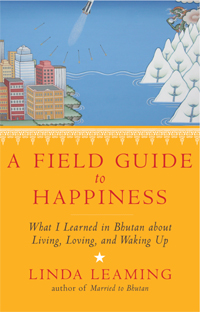Walking the Good Path
Linda Leaming, who found happiness in Bhutan, has some advice for worried Westerners
In A Field Guide to Happiness: What I Learned in Bhutan about Living, Loving, and Waking Up, her second memoir, part-time Nashville resident Linda Leaming once again combines fascinating descriptions of a country most readers will never visit with funny, touching, and sometimes harrowing stories about her life there. In her first book, Married to Bhutan, Leaming skillfully combined two love stories: the tale of falling in love with the country itself and the tale of marrying Bhutanese painter Phurba Namgay. In the new memoir, she looks at how living in Bhutan has helped her grow.
 Bhutan is a perfect place for a hyperactive, high-maintenance Westerner (and in Bhutan we’d probably be all categorized that way) to learn some wisdom. For Leaming the lessons began immediately upon her arriving—her luggage did not arrive with her.
Bhutan is a perfect place for a hyperactive, high-maintenance Westerner (and in Bhutan we’d probably be all categorized that way) to learn some wisdom. For Leaming the lessons began immediately upon her arriving—her luggage did not arrive with her.
Talk about a literal and metaphorical new beginning: “In Bhutan I had to make a change pretty quickly and learn to be calm,” Leaming writes. “My life here was only as good as my ability to adapt to the new culture, a new schedule, new and different food, different people, different manners, different accommodations, and a hundred other variables.” A trip to the bank, for example, was no stroll to an ATM:
First, I had to give my paperwork to someone at a desk and receive a token. It was always a different person at a different desk. Then it was at least a two-hour wait with the token in hand in front of the teller window at the other side of the bank to sign more paperwork and finally, when the “doorbell” went off and my token number appeared on the tote board, I got my cash from the teller. During this process, I’d shake my head in disbelief, sigh deeply, roll my eyes, and occasionally vocalize my irritation. Huffing. Sighing. Looking irritated. Sometimes complaining out loud. The complaining and bristling and giving everyone looks of disapproval not only got me nowhere, I think it lengthened the time it took to get my cash. The Bhutanese do passive-aggressive well.
In another section, Leaming’s beloved washing machine breaks down, and she sends her husband off to search the town for a replacement belt. He comes home, hours later, with a salad spinner instead. But then Leaming had learned that anger would accomplish nothing. She decided “to enjoy the moment, pick some lettuce from the garden, wash it, and, what the hell, spin it. At least something in the house would be clean.”
 A Field Guide to Happiness, like Married to Bhutan, is a love letter to Leaming’s adopted country. It is full of interesting tidbits that most Westerners don’t know (and, let’s face it, many may not even know that Bhutan exists). Leaming writes about how, in 2003, the king of Bhutan himself led an army against Indian rebels. She tells of Bhutan’s patron saint, who would shoot fire out of his penis to conquer demons and, when there were no demons around, seduce farm wives. She is realistic about the dangers of this tiny kingdom in the Himalayas—treacherous mountain roads, attacking monkeys and wild boars, or falling boulders—but she leaves no doubt that the beauty of this land and its people outweigh any danger or inconvenience.
A Field Guide to Happiness, like Married to Bhutan, is a love letter to Leaming’s adopted country. It is full of interesting tidbits that most Westerners don’t know (and, let’s face it, many may not even know that Bhutan exists). Leaming writes about how, in 2003, the king of Bhutan himself led an army against Indian rebels. She tells of Bhutan’s patron saint, who would shoot fire out of his penis to conquer demons and, when there were no demons around, seduce farm wives. She is realistic about the dangers of this tiny kingdom in the Himalayas—treacherous mountain roads, attacking monkeys and wild boars, or falling boulders—but she leaves no doubt that the beauty of this land and its people outweigh any danger or inconvenience.
Still, Leaming is no Gulliver who can no longer stand to live among her own people. She and her husband live part of the year in Nashville, where they appreciate developed-world luxuries. (Namgay especially likes late-night infomercials.) And probably nowhere is Leaming’s Bhutanese outlook more helpful than when she goes into a phone store in Nashville to get her account credited.
While she tells these stories with characteristic humor, there is no doubt that some of her wisdom stems from living through painful experiences. Other life lessons come from the example of the Bhutanese people themselves. In one story, the “mad monk,” a mentally ill man with a fear of being enclosed, made a bed for himself on the side of the road, and blankets anonymously appeared beside him. But as the weather turned colder, “some compassionate soul built a wooden frame around his concrete sleeping slab and stretched heavy plastic over the four walls and top to keep the wind out,” Leaming writes. “There was even a little door with hinge! Soon the little plastic house was filled with more blankets. The monk could be a little warmer at night yet still feel unencumbered, and if he woke up in the night, he could still see the stars. No one ever came forward to admit to building the little hut. But why would they? It’s Bhutan.”
A Field Guide to Happiness is a self-help book in the very best sense. Each chapter title has a suggestion for happiness: “Don’t expect things to always work out,” “Laugh in the face of death,” “Parent yourself,” and “Generosity is contagious.” Most of Leaming’s readers will never go to Bhutan (perhaps especially after reading about the abrupt turns and quick dives that planes must make to land at the airport), but karma luckily sent Linda Leaming there, and we can experience its beauty through her. And maybe even become better people at the same time.

Faye Jones, dean of learning resources at Nashville State Community College, writes the Jolly Librarian blog for the college’s Mayfield Library. She earned her doctorate in nineteenth-century literature at Indiana University of Pennsylvania.


